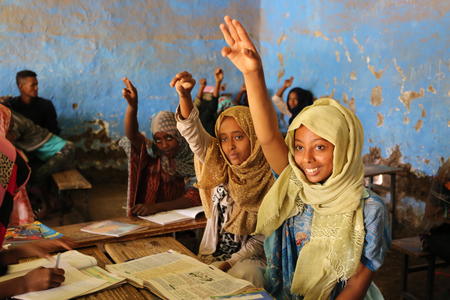How sustainable finance can enable Sustainable Development Goals and meet human rights

In the face of a global pandemic, climate crisis and spiralling debt, financing for water, sanitation and hygiene (WASH) must be affordable, green, inclusive and support long-term strengthening of national systems that can fulfill these human rights for all. End Water Poverty and WaterAid colleagues introduce our new report, which shows how financing gaps for achieving universal access to WASH can be met.
The uneven and inadequate global response to COVID-19 is exposing chronic under-investment in the human rights to water, sanitation, food, education, health and housing.
COVID-19 and the climate crisis highlight and compound the effects of the water crisis
More than two billion people lack access to safe water and three billion people to basic handwashing facilities, a first line of defence against this and other pandemics; more than a billion people live in slums, too close together to practise physical distancing; and at least half of the world’s population do not have access to essential health services. The crisis jeopardises learning opportunities for hundreds of millions of children and the livelihoods of almost half the global workforce.
Five years ago, 193 countries adopted the historic Agenda 2030 for Sustainable Development, committing to a common vision and a universal development agenda that “leaves no-one behind”. The resources have not matched the rhetoric, however, and COVID-19 is now undermining the fragile progress made. Global poverty levels are rising for the first time in decades and the Sustainable Development Goals (SDGs) 1 and 2 to end extreme poverty and hunger are seriously off track.
The pandemic also coincides with a greater, even existential threat: unprecedentedly high temperatures in the Arctic; the heating of the world’s oceans; and lethal bush fires, cyclones and other extreme events around the world manifest the scientific consensus that planet Earth faces a clear and unequivocal climate emergency.
Financing gaps for universal WASH access can be met through a new, sustainable global order
These combined social, economic and environmental crises show the urgent need to make progress on all SDGs and inspire new, collective action towards a more just, equitable and sustainable global order. Central to this agenda is finance, but, in many countries – and especially in low-income and lower-middle-income economies – the SDGs are severely underfunded, and there is little or no prospect of this changing for the better. COVID-19 is likely to reduce domestic resource mobilisation and external support for the SDGs in developing countries by at least US$400 billion in 2020–21. External debt service obligations have reached unpayable levels: $1.5 trillion is owed each year between 2022–24.
Common purpose, common future, a new report from End Water Poverty and WaterAid, shows that the financing gaps for achieving universal access to safe water, sanitation and hygiene (SDG 6) and Agenda 2030 can, although large, nevertheless be met. However, the resurfacing of past problems of indebtedness signals that new solutions are needed, solutions that are not ad hoc or biased towards short-term interests and outcomes. Instead, the necessary funds should be raised and spent in ways that are affordable, green, inclusive and support the long-term strengthening of national systems necessary for the fulfilment of human rights for all – in short, genuinely sustainable finance.
New resources can be raised from allocations of IMF Special Drawing Rights; a global phasing out of fossil fuel subsidies; developing country debt cancellation; increases in grant-based official development assistance and climate finance; action on tax evasion and off-shore tax havens; and new taxes on carbon emissions, financial transactions and wealth.
Together, these actions could lead to a transformation in public finance that prioritises the SDGs each year through to 2030, and acts as a catalyst and complement to available domestic and international private finance. Crucially, they can deliver real progress on the SDGs and against the COVID-19 pandemic, without adding to a growing and unsustainable debt burden in developing countries.
COVID-19 demonstrates how a chain is only as strong as its weakest link. It is more important than ever, in this crisis year of 2020, that the international community comes together to realise the SDGs, the Paris Agreement and the Addis Ababa Action Agenda, implementing the policies and mobilising the resources necessary for their achievement, towards a common purpose and a common future.
Al-hassan Adam is International Coordinator for End Water Poverty; Chilufya Chileshe is Regional Advocacy Manager for WaterAid in Southern Africa and tweets as @ChilufyaC; John Garrett is Senior Policy Analyst – Development Finance at WaterAid and tweets as @JohnGarre; and Katie Tobin is Advocacy Adviser at WaterAid and tweets as @travelingKT.




